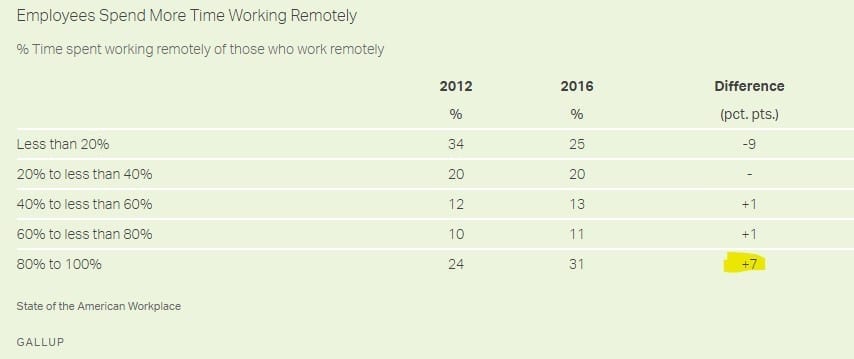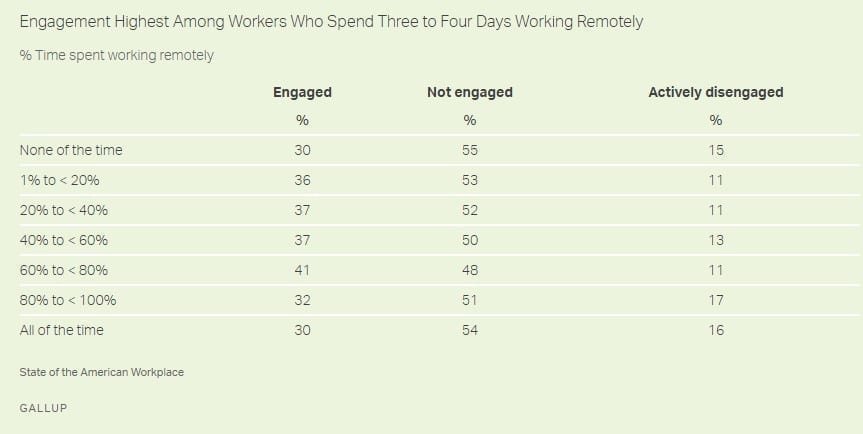Work from Home – Studies show Incredible benefits
Different companies are looking at work very differently now. They are trying to evaluate if the current COVID-19 enforced ‘Work from Home’ arrangements can be continued? If they can have a mixed approach – where you work off-site for most times but have face time in the office with your colleagues one or two days a week.
Google, for example, is looking at employees working from home for the entire year. Facebook is planning for permanent work from home arrangements.
Gallup has been looking at this for quite some time now.
Increasing Work from Home trends
In 2012, for example, 39% of employees worked remotely in some capacity. This increased to 43% in 2016.

Engagement with work and those you work with is a major factor for a team’s good performance.
Gallup discovered that engagement climbs when employees spend some time working remotely and some time working in a location with their coworkers. Weekly face time with coworkers and managers seems to affect engagement: the optimal engagement boost occurs when employees spend 60% to 80% of their time working off-site — or three to four days in a five-day workweek.
Those who work remotely remotely 60% to 80% of the time, feel more engaged and cared for by their company. These are also the employees who tend to:
- strongly agree that someone at work cares about them as a person, encourages their development and has talked to them about their progress
- strongly agree they have a best friend at work and opportunities to learn and grow

In fact, 54% of the office workers say that they would leave their job for one that offers flexible work time.
Stanford study on impact of Work from Home
Based on an interesting experiment at the Chinese travel website Ctrip, Stanford professor Nicholas Bloom shared a Stanford case study (shared in Harvard Business Review) of how work from home impacted productivity.
Nicholas Bloom and graduate student James Liang, who is also a cofounder of the Chinese travel website Ctrip, gave the staff at Ctrip’s call center the opportunity to volunteer to work from home for nine months. Half the volunteers were allowed to telecommute; the rest remained in the office as a control group.
The conclusion of the study was remarkable – that in comparison to the employees who came to the office, those who were working from home were not only happier and less likely to quit but also more productive.
So do you want to try the Work-from-home policy in your company? It will surely benefit the environment, not just the employee productivity.
Improved air quality and environment
In Los Angeles, the highway traffic is down by more than half, and emissions that created the smog and soot have also reduced by the same amount. The result is that Californians are seeing much improved air quality. As per a UCLA researcher, the COVID-19 induced lockdown time has been the longest period of good air quality days since 1995!
In Delhi, the air quality index (AQI) levels are usually above 200, while the WHO safe limit is below 25. In bad times, the AQI can soar as high as 900 and even off the measurement scale sometimes.
During the lockdown though, the AQI is an astonishing 20! And, the skies are suddenly looking blue again. In fact, after a rain, it had fallen to 7.
Downside of Work from Home situation
So are there no downsides to working from home? Is it the greatest way to work? Probably not. I have worked from home for many years and also worked in an office. I have personally found working from home creates a sense of loneliness. There is very little linking you with the people you work with. When you are in the office, you can walk up to them, even go out for a walk or sit for a coffee or go out for lunch. That personal touch is gone when you work from home.
Businesses may also find that their employees are less engaged and that their level of work drops. This isn’t always the case, but it may happen sometimes. It is difficult for businesses to keep staff engaged at this time, but there are things they can do which may help. Firstly, they could create a private podcast. This is something that staff could listen to whilst working, or driving, or cooking etc. and could involve talking about the business or relevant industry or even educating them on a new skill. Secondly, regularly video conferences are also a great idea to keep up communications and staff morale. Some employees will actually enjoy working from home, but those who don’t need support so they don’t become isolated and lonely.
That loneliness is what hits many who work from home. Here is one guy who left the corporate job and found that to be the major downside to work from home arrangement.




Comments ()